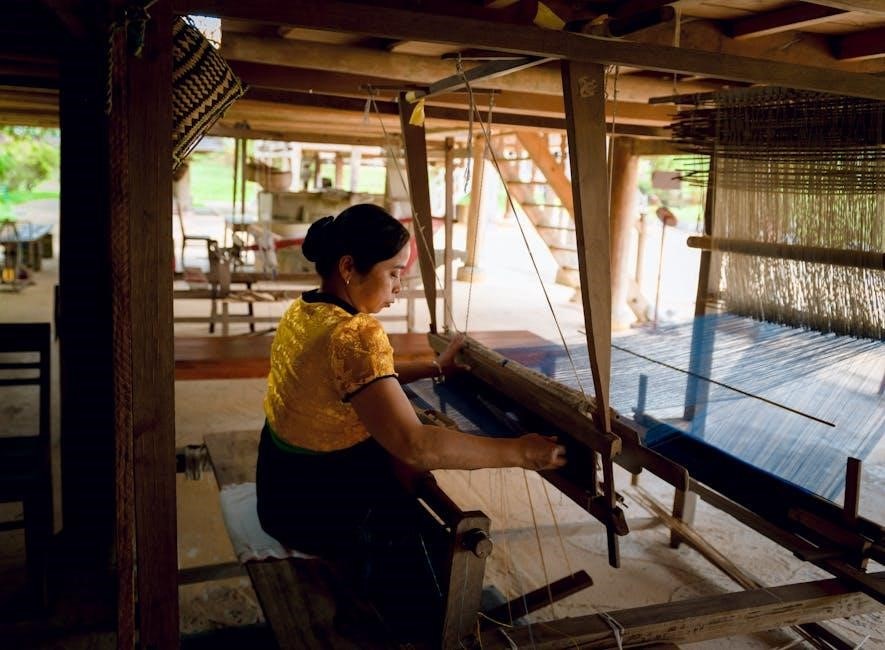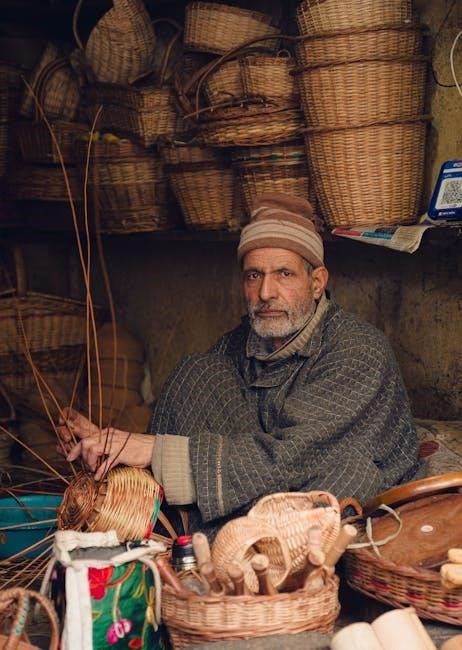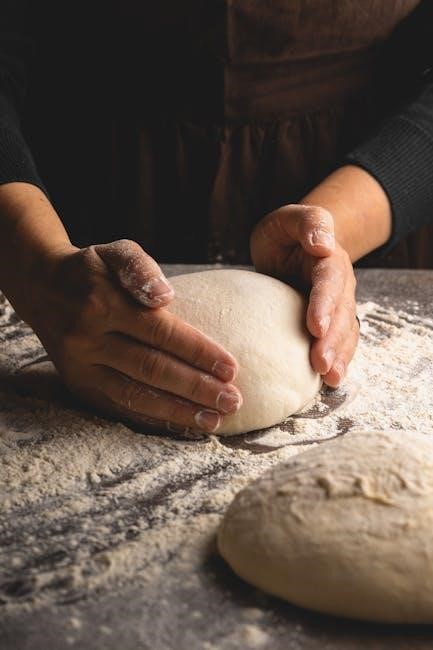Back to Basics offers a comprehensive guide to traditional skills, empowering individuals to embrace self-sufficiency and simplify their lives through timeless practices in food, crafts, and survival.
What Does “Back to Basics” Mean?
Back to Basics refers to a movement that emphasizes returning to fundamental, traditional practices and skills. It encourages individuals to reconnect with natural processes, such as growing food, crafting, and self-sufficiency, often overlooked in modern life; This approach promotes simplicity, sustainability, and a deeper connection to the world around us. By focusing on essential skills like food preservation, woodworking, and herbalism, Back to Basics empowers people to live more independently and mindfully. It’s about rediscovering timeless knowledge and applying it to create a more fulfilling and resilient lifestyle.
Why Are Traditional Skills Important?
Traditional skills are essential for fostering self-sufficiency, resilience, and a deeper connection to the environment. They provide practical knowledge that can be applied in everyday life, promoting sustainability and reducing reliance on modern conveniences. By mastering these skills, individuals can cultivate independence, enhance creativity, and preserve cultural heritage. Additionally, traditional practices often align with eco-friendly living, encouraging a healthier relationship with nature. In a rapidly changing world, these timeless skills offer a sense of stability and empower individuals to navigate challenges with confidence. They are not just nostalgic remnants of the past but valuable tools for building a more fulfilling and sustainable future.

Food Skills
Food skills are vital for self-sufficiency, covering growing herbs, fruits, and vegetables, preserving techniques, and traditional cooking methods to ensure a sustainable and nourishing lifestyle.
Growing Your Own Food
Growing your own food is a cornerstone of self-sufficiency, allowing you to cultivate fresh, nutritious produce right in your backyard. Begin by selecting herbs, fruits, and vegetables suited to your climate, ensuring a bountiful harvest. Start small with easy-to-grow plants like tomatoes or leafy greens, gradually expanding as you gain experience. Proper soil preparation and regular maintenance are key to healthy growth. Consider grafting techniques to diversify your crops and extend the growing season. Additionally, raising chickens for eggs or meat can complement your garden, creating a sustainable food system. This approach not only reduces reliance on external sources but also fosters a deeper connection to the land and the joy of nurturing your own food from seed to plate.
Food Preservation Techniques
Food preservation is an essential skill for maintaining self-sufficiency, allowing you to enjoy seasonal produce year-round. Techniques like canning, freezing, and dehydrating help lock in nutrients and flavors while extending shelf life. Canning involves sealing food in airtight containers, creating a vacuum that prevents spoilage. Freezing is ideal for retaining the freshness of fruits, vegetables, and meats. Dehydrating removes moisture, making foods lightweight and easy to store. Pickling, another traditional method, uses vinegar or fermentation to preserve foods while adding unique flavors. Root cellaring is also effective for storing vegetables like potatoes and carrots in cool, dark environments. These methods not only preserve food but also promote sustainability and reduce waste, ensuring you can enjoy your harvest throughout the year.
Traditional Cooking Methods
Traditional cooking methods emphasize simplicity and the use of whole ingredients, reconnecting us with the essence of food preparation. Techniques like roasting, stewing, and pickling highlight the flavors of fresh, locally sourced ingredients. Baking bread from scratch, fermenting foods, and smoking meats are timeless practices that not only preserve nutrients but also create lasting memories. These methods often require patience and attention to detail, fostering a deeper appreciation for the culinary process. By mastering traditional cooking, individuals can reduce reliance on processed foods and enjoy healthier, more authentic meals. These skills are not only practical but also contribute to a more sustainable and self-sufficient lifestyle.

Traditional Crafts
Traditional crafts revitalize heritage skills, fostering creativity and self-sufficiency. From natural dyes and textiles to woodworking, blacksmithing, and crafting, these practices connect us to our roots and enrich our lives sustainably.
Natural Dyes and Textiles
Natural dyes and textiles offer a sustainable way to create vibrant, eco-friendly materials. Learn to extract colors from plants, herbs, and minerals, and craft durable fabrics using traditional techniques. This practice not only reduces environmental impact but also connects us to ancient methods of textile production. By mastering natural dyes, you can create unique, handcrafted garments and home textiles. This skill fosters creativity and self-sufficiency, allowing you to personalize your belongings while promoting a greener lifestyle. Discover the art of transforming raw materials into beautiful, functional pieces that reflect a deeper connection to nature and heritage.
Woodworking and Carpentry
Woodworking and carpentry are essential skills for creating functional and beautiful items from natural materials. These traditions allow you to craft furniture, tools, and structures, fostering self-sufficiency and creativity. By mastering woodworking, you can repair, build, or customize items for your home, reducing reliance on industrial products. Carpentry skills extend to constructing shelters, cabinets, and other essential items, blending practicality with artistry. Working with wood connects you to natural resources and heritage, offering a sense of accomplishment and sustainability. Whether you’re making a simple cutting board or a complex piece of furniture, woodworking and carpentry provide lasting value and satisfaction.
Blacksmithing Basics
Blacksmithing is the art of shaping metal through heat and force, allowing individuals to craft essential tools, hardware, and decorative items. This traditional skill requires a forge, anvil, and hammer, enabling the creation of items like knives, axes, and nails. By mastering basic techniques such as heating, hammering, and tempering, you can produce durable, long-lasting tools. Blacksmithing connects us to our heritage, offering a sense of accomplishment and self-sufficiency. It also promotes sustainability by repairing or repurposing metal items instead of discarding them. Whether for practical use or artistic expression, blacksmithing basics provide a foundation for creating functional and meaningful objects, keeping this timeless craft alive in modern times.
Crafting and Sewing
Crafting and sewing are timeless skills that empower individuals to create functional and decorative items, fostering creativity and self-sufficiency. From stitching clothing to crafting handmade goods, these skills allow for personal expression while reducing reliance on mass-produced products. Crafting and sewing also promote sustainability by enabling the repair and repurposing of materials, extending the life of fabrics and textiles. Whether making a quilt, embroidering designs, or creating household items, these skills connect us to our heritage and provide a sense of accomplishment. They are essential for anyone looking to embrace a simpler, more resourceful lifestyle, offering both practical utility and artistic fulfillment.

Home and Living
Discover traditional home and living skills, focusing on natural building materials, DIY repairs, and eco-friendly practices to create sustainable and self-sufficient living spaces with timeless charm.
Natural Building Materials
Natural building materials, such as wood, stone, clay, and straw bales, offer sustainable and renewable options for constructing eco-friendly homes. These materials are often locally sourced, reducing transportation costs and environmental impact. Traditional techniques like cob building and natural insulation methods promote energy efficiency and durability. Using natural materials not only supports a healthier indoor environment but also aligns with eco-conscious living practices. By embracing these timeless methods, individuals can create homes that are both functional and harmonious with nature. This approach to construction fosters a deeper connection to the land and encourages self-sufficiency, making it a cornerstone of traditional skills for modern living.
DIY Home Repairs
DIY home repairs empower individuals to tackle common household issues independently, saving time and money. From fixing leaky faucets to patching walls, these skills enhance self-sufficiency and reduce reliance on external services. Learning basic plumbing, electrical work, and carpentry can transform a homeowner into a handy problem-solver. Simple tools and materials, along with step-by-step guides, make DIY repairs accessible to everyone. By mastering these traditional skills, individuals can maintain their homes efficiently and safely, fostering a sense of accomplishment and confidence. DIY home repairs also promote sustainability by extending the life of materials and reducing waste. With practice, anyone can become proficient in keeping their home in great condition.
Eco-Friendly Living Practices
Eco-friendly living practices are essential for creating a sustainable and harmonious relationship with the environment. By adopting traditional skills, individuals can reduce their ecological footprint through simple, effective methods. Practices such as composting, recycling, and using natural cleaning products help minimize waste and promote a healthier lifestyle. Conserving water and energy by utilizing rainwater harvesting and renewable energy sources further supports eco-conscious living. Sustainable gardening, including growing organic produce and using natural pest control, aligns with the “back to basics” philosophy. These practices not only benefit the planet but also foster a sense of responsibility and connection to nature. Embracing eco-friendly habits encourages a simpler, more self-sufficient way of life.

Outdoor and Survival Skills
Master essential techniques for thriving in nature, from camping and foraging to building shelters, starting fires, and navigating terrain, ensuring safety and confidence in remote environments.
Camping and Wilderness Survival
Camping and wilderness survival are cornerstone skills for anyone embracing a self-sufficient lifestyle. Learning to pitch a tent, start a fire without modern tools, and build a shelter using natural materials ensures safety in remote areas. Understanding how to locate and purify water sources, identify edible plants, and navigate using compass and stars is essential. Practical knowledge of wildlife behavior and basic first aid further enhances preparedness. These skills not only foster independence but also deepen one’s connection with nature. By mastering the basics of wilderness survival, individuals can confidently explore and thrive in the outdoors, relying on timeless techniques passed down through generations.
Foraging for Wild Foods
Foraging for wild foods is a timeless skill that connects us with nature and provides fresh, nutritious ingredients. It involves identifying edible plants, such as berries, mushrooms, and herbs, that grow in their natural habitats. Safety is paramount, as some wild plants can be poisonous. Learning to distinguish between safe and harmful species is essential. Tools like field guides, expert guidance, and careful observation are key to successful foraging. This practice not only enhances self-sufficiency but also fosters a deeper appreciation for the environment. By embracing foraging, individuals can enjoy seasonal bounty, reduce reliance on industrial food systems, and reconnect with the natural world. It’s a simple yet rewarding way to live in harmony with the land and its resources.
Hunting and Fishing Basics
Hunting and fishing are essential skills for procuring fresh, sustainable food while connecting with nature. These practices require patience, knowledge of wildlife, and understanding of local regulations. Hunting involves mastering tools like rifles or bows, as well as tracking and ethical harvesting of game. Fishing, whether with a line, hook, or net, demands knowledge of water ecosystems and seasonal behaviors of fish. Both activities emphasize sustainability, ensuring that natural resources are not overexploited. Learning these basics fosters self-reliance and a deeper appreciation for the environment. By respecting the land and its creatures, individuals can enjoy a timeless tradition that provides nourishment and strengthens their bond with the outdoors.
Navigation and Orienteering
Mastering navigation and orienteering is crucial for exploring the outdoors confidently. These skills involve using maps, compasses, and natural landmarks to determine direction and location. Orienteering often incorporates GPS tools for precision, while traditional methods rely on celestial navigation and terrain recognition. Understanding how to read topographic maps and use a compass is foundational. Additionally, recognizing natural signs, such as the position of the sun or patterns of vegetation, can guide you in the wilderness. These techniques are vital for hikers, campers, and anyone venturing into remote areas. By combining modern tools with timeless observational skills, navigation and orienteering empower individuals to navigate unfamiliar territories with ease and safety.

Health and Wellness
Back to Basics emphasizes traditional health practices, focusing on natural remedies, herbalism, and mental well-being. These timeless methods promote self-reliance and holistic wellness.
Natural Remedies and Herbalism
Natural remedies and herbalism are cornerstone elements of traditional health practices. The guide explores the art of creating herbal medicines, highlighting the use of plants for healing. It details how to harness the properties of herbs to address common ailments, offering practical advice on growing and preparing remedies. This approach to health emphasizes sustainability and self-reliance, aligning with the broader philosophy of returning to simple, effective methods. By understanding and utilizing nature’s resources, individuals can take charge of their well-being in a holistic and eco-friendly way, fostering a deeper connection to the natural world and its healing potential.
First Aid and Emergency Care
First aid and emergency care are essential skills for every individual, enabling quick and effective responses to injuries and illnesses. The guide provides clear, step-by-step instructions for treating wounds, splinting fractures, and managing common medical emergencies. It emphasizes the importance of staying calm and using readily available resources to stabilize conditions until professional help arrives. By mastering these traditional techniques, individuals can provide critical care in situations where modern medical facilities are unavailable. This section aligns with the broader philosophy of self-reliance, equipping readers with the knowledge to act confidently and compassionately in times of need.

Mental and Emotional Well-being
Mental and emotional well-being are cornerstone elements of a balanced life, and traditional skills play a significant role in fostering resilience and calmness. Engaging in activities like journaling, meditation, and connecting with nature can help reduce stress and promote clarity of mind. The guide emphasizes the importance of mindfulness and self-awareness, offering practical steps to cultivate emotional stability. By embracing simplicity and focusing on meaningful practices, individuals can reclaim their mental health and build a stronger sense of purpose. These timeless techniques encourage a holistic approach to well-being, empowering individuals to navigate life’s challenges with grace and confidence.

Personal Development
Personal development involves mastering time management, productivity, and self-discipline to achieve personal goals. Traditional skills foster resilience and adaptability, essential for a more purposeful and fulfilling life.
Time Management and Productivity
Mastering time management and productivity is essential for a balanced life. Traditional skills encourage prioritizing tasks, setting realistic goals, and creating schedules to optimize efficiency. By focusing on essential activities like growing food, crafting, or preserving, individuals can reduce distractions and achieve more with fewer resources. These practices foster mindfulness and discipline, helping individuals allocate time wisely for work, leisure, and personal growth. Embracing simplicity and avoiding overcomplication allows for greater productivity and satisfaction in daily life. These timeless strategies empower individuals to thrive in both modern and traditional contexts, ensuring a more fulfilling and purpose-driven lifestyle. By adhering to these principles, one can enhance overall productivity while maintaining a sense of accomplishment and well-being.
Financial Literacy and Budgeting
Financial literacy and budgeting are foundational skills for achieving self-sufficiency. By understanding how to manage resources effectively, individuals can create sustainable lifestyles rooted in traditional practices. Budgeting involves prioritizing essential expenses, such as tools, materials, and land, while minimizing unnecessary costs. This approach encourages saving, investing in skills like gardening or crafting, and avoiding debt. Traditional skills often emphasize frugality and resourcefulness, teaching individuals to allocate finances wisely for long-term benefits. By adopting these principles, people can reduce reliance on external systems and build resilient, financially stable households. Financial literacy is not just about money—it’s about making intentional choices that align with a simpler, more self-reliant way of life.
Building Resilience and Adaptability
Building resilience and adaptability are core components of mastering traditional skills. These qualities empower individuals to navigate life’s challenges with confidence and flexibility. By learning to grow food, preserve resources, and repair items, people develop a mindset that embraces problem-solving and resourcefulness. Traditional skills encourage individuals to adapt to changing circumstances, such as economic shifts or environmental challenges, by relying on timeless practices. Resilience is strengthened through hands-on experiences, teaching patience and perseverance. Adaptability is honed as individuals learn to repurpose materials and innovate using simple tools. Together, these traits foster a lifestyle of self-reliance, enabling individuals to thrive in uncertain times and maintain a sense of stability and security.

Community and Social Skills
Community and social skills emphasize effective communication, active listening, and conflict resolution. Building strong relationships fosters resilience, collaboration, and a supportive network, essential for thriving communities.
Communication and Conflict Resolution
Effective communication and conflict resolution are cornerstone skills for building and maintaining strong relationships. Learning to express ideas clearly, listen actively, and empathize with others fosters understanding and cooperation. These skills help navigate disagreements constructively, promoting harmony in personal and community settings. By mastering non-verbal cues, negotiation, and mediation techniques, individuals can resolve conflicts amicably. Strong communication also enhances collaboration, ensuring collective goals are met efficiently. In a world where misunderstandings often arise, these traditional skills empower individuals to connect meaningfully and address challenges with grace and resilience, fostering a supportive and unified community.
Building Strong Community Ties

Building strong community ties is essential for creating a supportive and interconnected society. Traditional skills such as volunteering, participating in local events, and collaborating on shared projects foster a sense of belonging and mutual support. Engaging in collective activities strengthens relationships, builds trust, and promotes unity. By investing time and effort into community endeavors, individuals can help create resilient networks that benefit everyone. Strong community ties also encourage shared knowledge, resources, and problem-solving, ensuring that no one is left behind. Cultivating these connections is a timeless skill that enriches lives and lays the foundation for a thriving, cohesive community.
Volunteering and Giving Back
Volunteering and giving back are fundamental aspects of fostering a sense of purpose and connection within communities. By dedicating time and effort to help others, individuals contribute to the well-being of those in need while building meaningful relationships. Traditional skills like organizing community events, mentoring others, or supporting local causes create lasting impacts. Volunteering also provides opportunities to learn new skills, gain perspective, and strengthen empathy. Giving back not only benefits others but also enriches the giver, promoting personal growth and a deeper understanding of community needs. Embracing this practice cultivates gratitude and reinforces the importance of collective support, making it a timeless and invaluable skill for individuals and societies alike.
